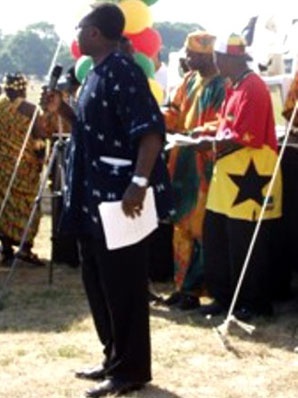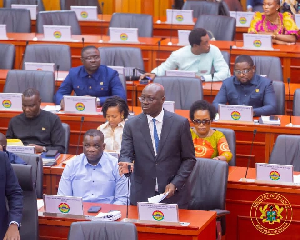Dr. Samuel Akainyah of the popular Akainya gallery in Chicago, a teacher, an author, a philanthropist and artist was listed amongst influential people like Oprah Winfrey, Jesse White, Rev. Dr. Jeremiah A. Wright, Johnnie B. ?Dusty? Baker of Chicago White Socks and others as the most influential African Americans in the city of Chicago, in the December 2005-January 2006 issue of the N?digo, a popular weekly newspaper in Chicago.
Dr. Akainyah, educated at the Art Institute of Chicago and the prestigious University of Chicago is a real icon in Chicago. His national and international reputation as an artist and sole owner of the Akainyah Galleries has brought him in touch with several Chicago dignitaries including reporters, executives, bankers, television news anchors, and politicians. Some of his famed clients include the actor Samuel Jackson, boxing legend Mohammed Ali, basketball legend Michael Jordan, news anchor and producer Bill Curtis and His Excellency, President J.A. Kuffuor.
His contributions to the Ghanaian community and the city of Chicago have earned him many awards from the Ghanaian community and the city of Chicago. The latest award from the community is the service honor award for his numerous contributions to the community and Ghana.
This year marks the third time the N?DIGO editorial board has compiled a list of who they believe represents the proverbial cr?me de Ia cr?me of African Americans in Chicago. The talked-about feature is a challenging, uplifting, and hot topic to be sure: one that easily becomes water cooler talk the moment the issue hits the streets.
Why? Anytime you select people, places and things, and segregate them as the finest, people stand up and take notice. But in this context, such talk is a good thing, for as N?digo publisher Hermene Hartman has repeatedly explained over the years, she founded the publication because the numerous worthy and inspirational stories of achieving African Americans needed to be re-told, after being mistold or untold by the mainstream media.
Constructing a ?who?s who? list provides an opportunity to fete business leaders and professional achievers, change agents, catalysts, cultural inspirations, and enterprising entrepreneurs. Various criteria ? some concrete and indisputable, some nebulous and intangible ? are considered to decide who?s changing the game, who is influencing the influencers, who?s making money, who is opening doors and shaking trees, and who?s doing good and doing well at the same time.
Some of the editorial board?s original selections preferred to fly below the radar screen, and while flattered by the recognition, declined to participate in this feature. Other chosen subjects did not respond, while others featured in N?DIGO?s last who?s who presentation in 2003 retired, passed away, changed careers or positions, or dropped a notch or two in their status, visibility and influence.
The listings in the issue obviously provide just a limited snapshot (based on information supplied by each subject) of the achiever?s professional life. However, to paraphrase a famous American Express advertising slogan, inclusion in N?DIGO?s who?s who list of African Americans has its own rewards.
Diaspora News of Wednesday, 19 April 2006
Source: N?DJGO Editorial Board/ Bedzra Dzokoto













